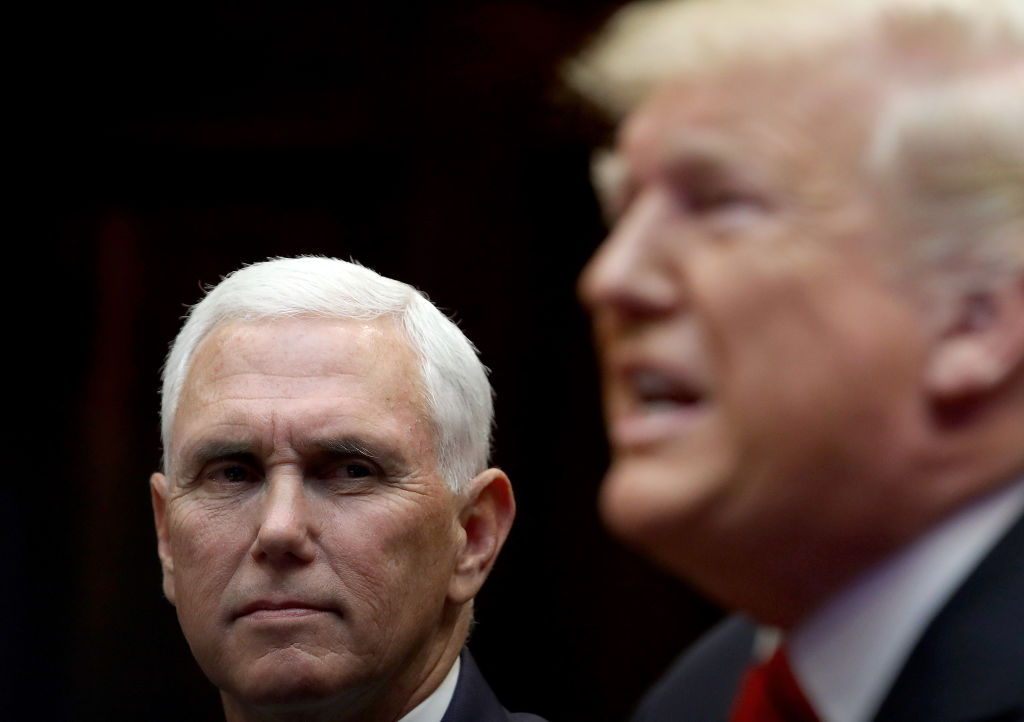Finding dignity in politics is like finding jewelry in a sewer system. There’s some there, rest assured; all you need to do is search.
But, good lord, the foulness you’ll endure while looking for it is unspeakable.
I’ve gotten used to it to a degree, as any sewer worker does. But on Friday I nearly choked on the fumes of cynical grifting putridity:
Anyone who once vowed never to vote for Donald Trump and now finds himself willing to walk over broken glass for him after a coup attempt and assorted impeachments and indictments has either cashed in his soul or been brain-poisoned by his own populist propaganda.
That’s the story of the conservative movement since 2016, by and large. Unspeakable.
But then, lo and behold: Jewelry.
On some level it’s silly to be impressed that Mike Pence would decline to endorse Trump this year. Human beings don’t usually endorse those who’ve wished death on them, do they?
But it is impressive—daring, even—given how Trump’s other Republican enemies have repaid his antagonism with obsequiousness. Pence’s political journey since the morning of January 6, 2021, is one of a dignified man reclaiming the honor he squandered in 2016 when he agreed to vouch for someone whom he surely knew was unfit for the presidency. Refusing to endorse Trump this cycle feels like the end of that journey. Very few conservatives have joined him on it.
Perhaps more will now be inspired to do so. Those of us hoping that Reaganite voters will withhold their support from the GOP nominee this fall need leaders with credibility among those voters to advocate for that position. For the last few months, the hunt for leadership focused on Nikki Haley. But not even Haley can match the stature of Trump’s own vice president declaring that he can no longer be supported in good conscience.
Forget the MAGA slogan: It’s Mike Pence who’s the real “America First” Republican.
Yet something about his reasoning in all of this has landed awkwardly. As he made clear on Face the Nation, his objections to Trump are chiefly about policy. “The reason why I won’t endorse Donald Trump this year is because I see him departing from the mainstream conservative agenda that has defined the Republican Party over the last 40 years and still has the best hope for the future of the country,” he said in the interview, citing Trump’s recent equivocations on banning abortion and TikTok, among other things.
Which feels like a cop-out. As conservative commentator S.E. Cupp pointed out, it suggests that a coup-plotting probable felon might earn the Pence seal of approval so long as he preached the gospel of Ronald Reagan. “Trump has always been at odds with the conservative agenda,” Cupp told CNN, “whether that was the debt and the deficit, limited government, family values, protectionism. Mike Pence seems to be fine with all of that.”
I don’t think Pence is fine with that or has ever been fine with that. The reason he’s flipped on Trump now, I suspect, is because he’s no longer giving him the benefit of the doubt.
If you’re the sort of conservative who’s willing to vote for someone whose photo appears next to “dark triad” in psychology textbooks so long as you get a few policy wins out of it, you had plenty of reasons to support Trump in 2020.
Tax cuts? He gave you those. A stronger border? That too. On foreign policy, he took out the leader of Iran’s Quds Force, enticed several Arab nations to normalize relations with Israel, and even provided weapons to Ukraine as it battled his friend Vladimir in the Donbas.
Oh, and he put three conservative justices on the Supreme Court who fulfilled the pro-life movement’s dream of overturning Roe v. Wade.
It wasn’t all sunshine and candy canes. Trump launched a trade war with China, flirted with yanking U.S. troops out of Afghanistan, and ran gruesome deficits, especially during COVID. But when Mike Pence celebrates how the Trump administration provided “conservative solutions to many important issues facing our nation,” he’s not just blowing smoke.
The difference between the first Trump presidency and the one that’s coming isn’t that the candidate has changed—it’s that the culture of the right has changed under his leadership. That new culture is destined to influence him in various malign ways if he returns to power.
Apart from immigration, about which Trump has always displayed a nationalist passion, many of the achievements in his first term were driven by the Reaganite conservatives with whom he surrounded himself. Mitch McConnell and Paul Ryan spearheaded the Trump tax cuts; national security hawks encouraged him to be tough on Iran and Russia; the Federalist Society had his ear on judicial nominations.
There was no populist political infrastructure within the Republican Party at the time for him to draw from in finding personnel, so he chose conservatives. And because he isn’t much of an ideologue except on a few issues, and understandably must have felt overwhelmed at first by the duties of an office he never expected to win, he relied heavily on those conservatives for guidance.
The next Trump presidency will be different.
Since 2016, most traditional Republicans in Washington have either converted to populism or been sidelined. The converts now aim to staff Trump’s second administration with like-minded authoritarian yes-men who will encourage the president’s nationalist instincts instead of resisting them. Cutting off Ukraine aid is likely; withdrawing from NATO is possible. The trade war with China will escalate. Pro-lifers will be disappointed by the federal effort to restrict abortion. There’s not even a pretense that entitlement reform will be seriously addressed.
Personnel is policy. I think Mike Pence realizes that and recognizes that a Trump who knows his way around the Oval Office and is now guarded by a phalanx of populist fanatics will be much harder for Reaganites to prevail upon in a second term.
He’s lost the benefit of the doubt that he’ll govern like a conservative.
That’s the meaning of Pence’s non-endorsement and the upshot of the final two months of Nikki Haley’s presidential campaign. The tacit contract since 2016 in which classical liberals receive lower marginal income tax rates or whatever in return for looking the other way at their leader’s psychopathy has been broken. Mike Pence is done pretending that Trump 2.0 won’t be meaningfully worse than Trump 1.0.
Not everyone has stopped giving him the benefit of the doubt, though.
You would think that a former and probably future president being anathematized by his own vice president would be the biggest political news story in America three days later. It isn’t.
It’s this dopey clip from Trump’s rally in Ohio on Saturday, which you’ll need to watch in full.
The uproar afterward reminded me of the famous line from the 2016 cycle about the media taking Trump literally but not seriously and his supporters taking him seriously but not literally. What did he mean by “bloodbath”?
For three days, various factions have raged online over it. Many liberals insist that he chose the word advisedly, with some—like the president of the United States—going so far as to remove the context about the auto industry from the clip to make what Trump said sound more sinister. He once incited a violent attempt to overthrow the government, you know; when he talks about bloodbaths in 2024, Democrats take him literally and seriously.
Trump supporters counter that their man is being smeared. The context suggests that he was speaking metaphorically about the havoc Biden’s policies would wreak on American auto workers in a second term. It’s completely banal, such that any media outlet that’s hyping it as alarming and newsworthy is dishonestly carrying water for their Democratic friends in an election year. In this case, MAGA is taking Trump neither literally nor seriously.
Some put a foot in both camps by arguing that the left’s unjustified hysteria over the clip will end up making it harder to raise awareness of Trump’s actual authoritarian menace. The more Democrats and the media cry wolf about commonplace metaphors, the more likely it is that the public will tune them out in the future when they complain about Trump saying things that truly are ominous and inflammatory. Which he does. A lot.
My question to the Trumpers defending him, both pro- and anti-anti-, is this: Why, in 2024, are you still so vehement about giving him the benefit of the doubt about his innocent intentions? What has he said or done over the past eight years to warrant such outrage on his behalf when he’s accused of threatening his enemies?
It’s the outrage that took me aback, not the willingness to defend him per se. I thought he was speaking metaphorically too and feel obliged to say so, as there’s virtue in telling the truth no matter whom it helps. As much as I loathe Trump and want to see him defeated, I’d never condone lying about him for electoral advantage. “Fake but accurate” is not a thing.
Still, all I could think while the “bloodbath” debate surged on stupidly this weekend was “I bet Mike Pence has gotten a metric ton of death threats since announcing that he won’t endorse Trump. And hardly anyone on the right who’s complaining about the so-called ‘bloodbath hoax’ cares about that at all, assuming they haven’t phoned in a few of the threats themselves.”
My former colleague Andrew Egger described the objection to Trump’s defenders elegantly today at The Bulwark. Even when they’re technically on the side of truth, as they are here, Trump and his apologists are actually engaged in a project to hide it from impressionable voters:
The thing to note is how Trump’s defenders continue to weaponize the discourse around Trump’s inflammatory rhetoric to obscure the obvious, unsubtle ways in which he has embraced lawlessness and violence.
…
When anti-anti-Trump voices natter on about subjects like a “bloodbath hoax,” this is what they’re doing: focusing attention away from Trump’s concrete authoritarian sympathies and toward his more nebulously ominous utterances, all to create a vague sense in the minds of those not following things too closely that any connection between Trump and violent authoritarianism is just media propaganda.
Precisely right. Trump’s defenders are chock full of Ben Shapiros whose moral perspective has been distorted so grotesquely by the demands of having to defend him every day that they can muster outrage at a slander only when he’s impugned by it, not when he’s doing the impugning. It’s not the truth they care about, it’s protecting him. Always.
As a case in point, here’s something else that happened this weekend that you probably didn’t hear about thanks to Trumpers and the liberal chumps who took the bait on the other side howling endlessly over what he meant by “bloodbath.”
At that same rally, he described the January 6 criminals as “hostages” and “unbelievable patriots.” Many times since 2016, even before he became the Republican nominee for president the first time, Trump has nudged his supporters to get rough with his enemies. And that message has been received: Being threatened with death by crazed Trump fans is now routine for his antagonists in public office, enough so that judges warn the jurors in his trials never to reveal their identities publicly.
“There Is No MAGA Movement Without Threats and Violence,” David French explained a few years ago, correctly.
By leaping to give Trump the benefit of the doubt about his good intentions in the “bloodbath” dispute, his apologists are aiming to erase the context that’s caused understandable alarm about the remark among his critics. No one would care if Mitch McConnell used the word “bloodbath” to describe Biden’s auto policies; people care when Trump does so because he’s given them plenty of reason, up to and including a riot at the Capitol that nearly ended with his own vice president being murdered, to do so.
Even if, like me, you believe he was speaking metaphorically this time, it’s fair to wonder how conditioned his base has been by his prior earnest ventures into violent incitement to hear words like “bloodbath” differently than the rest of us. After all, taking Trump “seriously but not literally,” as his fans supposedly do, cuts both ways. In 2016 it might have meant treating his apocalyptic rhetoric and earnest hints of violence as half-jokes or colorful metaphors; in 2024, having spent years being primed to view continued Democratic rule as portending “the destruction of our Nation,” maybe it requires treating colorful metaphors as earnest encouragement.
Or, as comedian John Fugelsang put it:
To bring this column full circle, I think there’s a fair chance Trump himself doesn’t know what he means.
That is, he might have used “bloodbath” metaphorically at his rally. But whether he could ever reach a point of such desperation that he’d condone an actual bloodbath, I doubt even he knows.
Take January 6. Having Mike Pence block the certification of Joe Biden’s electoral votes wasn’t part of Trump’s coup plot until late in the post-election period. His first attempt to overturn the results was to sue in court, alleging fraud; when that didn’t work he considered various sweaty schemes like seizing voting machines and having friendly state legislatures certify “alternate” slates of pro-Trump electors in states that he’d lost.
Only when that failed to deter the Electoral College from ratifying Biden’s victory did John Eastman get in his ear about the Pence option, a last-ditch resort to halt the transfer of power.
He’s quite susceptible to terrible, destructive advice from terrible, destructive people. Especially when his grip on power is slipping.
So we should all be modest in assuming too confidently about what Trump will and won’t do when he reaches his wit’s end. No sense of duty to the constitutional order will deter him in a desperate hour, only the sense of duty felt by his would-be accomplices. But as I’ve said, and as his former VP knows from firsthand experience, his new crop of populist advisers will feel that duty decidedly less keenly than the last crop did.
Every Reaganite will be asked to decide this fall whether Trump still deserves the benefit of the doubt on governing as a conservative and as a good steward of the American project. He does not.







Please note that we at The Dispatch hold ourselves, our work, and our commenters to a higher standard than other places on the internet. We welcome comments that foster genuine debate or discussion—including comments critical of us or our work—but responses that include ad hominem attacks on fellow Dispatch members or are intended to stoke fear and anger may be moderated.
You are currently using a limited time guest pass and do not have access to commenting. Consider subscribing to join the conversation.
With your membership, you only have the ability to comment on The Morning Dispatch articles. Consider upgrading to join the conversation everywhere.